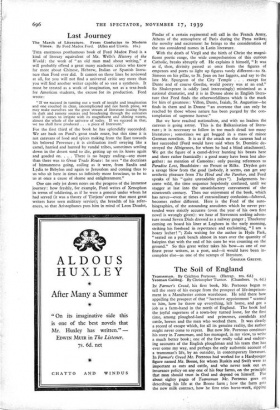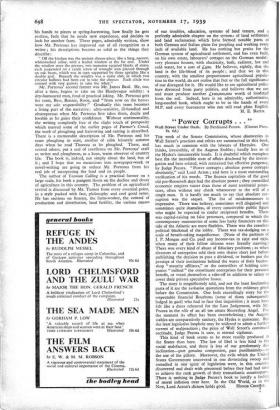The Soil of England
IN Farmer's Creed, his first book, Mr. Porteous began to tell the story of his escape from the prospect of life-imprison- ment in a Manchester cotton warehouse. He told there how appalling the prospect of that " lucrative appointment " seemed to him, how he threw up everything, left home, and got a job as a farm-hand in the north of England. The book had the joyful eagerness of a town-boy turned loose, for the first time, among ploughed-land and primroses, cornfields and cattle, horses and the men who worked them. It was clearly a record of escape which, for all its genuine reality, the author might never come to repeat. But now Mr. Porteous continues his story in Teamsman, and has managed, in my view, to write a much better book ; one of the few really solid and endear- ing accounts of the English ploughman and his team that has ever come my way, and perhaps the only authentic account of a teamsman's life, by an outsider, in contemporary literature. In Farmer's Greed Mr. Porteous had worked for a Hardyesque figure named Mr. Boone, for whom Ruskin and Swift were as important as oats and cattle, and who never took out an insurance policy on any one of his four farms, on the principle that man should trust in God and depend on himself. For about eighty pages of Teamsman Mr. Porteous goes on describing his life at the Boone farm ; how the farm gets the new milk contract, how he first tries horse-work, ripping
his hands to pieces at spring-harrowing, how finally he gets restless, feels that he needs new experience, and decides to look for another farm. These pages, admirably written, show how Mr. Porteous has improved out of all recognition as a writer ; his descriptions become as solid as the things they describe: " Off the kitchen was the ancient cheese-place, like a long, narrow, whitewashed cellar, with a leaded window at the far end. Under the window were the presses, two immense squared blocks of stone, each suspended on a crude screw of wrought iron pierced through an oak beam, which was in turn supported by three uprights like a double goal. Beneath the weights was a stone slab, in which two circular hollows had been cut to take the cheeses Each circle was crossed with tiny gutters to take the whey."
Mr. Porteous' second farmer was Mr. James Basil. He, too, after a time, begins to take on the Hardyesque solidity : a dry-humoured man, fond of practical joking. Mr. Porteous gets his team, Bess, Bonnie, Rosie, and "from now on the horses were my sole responsibility." Gradually this team becomes a living part of the narrative: ultra-sensitive, ill-handled and obstreperous when Mr. Porteous first takes them, docile and lovable as he gains their confidence. Without sentimentality, the writing completely free of the slight touch of pomposity
which marred some of the earlier pages of Farmer's Creed, the work of ploughing and harrowing and carting is described.
There is a memorable description of Mr. Porteous and his team ploughing in mist, another of calm leisurely autumn days when he read Thoreau as he ploughed. These, and several others, put a seal of excellence on Mr. Porteous' craft as writer and ploughman, as a keen, warm observer of country life. The book is, indeed, not simply about the land, but of it ; and I hope that no excursions into newspaper-work or novel-writing are going to seduce Mr. Porteous from his real job of interpreting the land and its people.
The author of Yeoman Calling is a practical farmer on a large kale, his book a pungent thesis on the decline and decay of agriculture in this country. The problem of an agricultural
revival is discussed by Mr. Tumor from every essential point, in a style packed with fact, philosophy and cool good sense. He has sections on finance, the farm-worker, the control of production and distribution, land fertility, the various causes of our troubles, education, systems of land tenure, and a perfectly admirable chapter on the systems of land settlement and land reclamation which haVe formed notable parts of both German and Italian plans for peopling and working every inch of available land. He has nothing but praise for the German system of agricultural settlement, and has even built, on his own estate, labourers' cottages on the German model: very pleasant houses, with electricity, bath, radiator, hot and cold water, for a cost of £400. He believes, rightly, that the land is the life-blood of its people ; and that we in this country, with the smallest proportionate agricultural popula- tion in the world, do not realise that fact or the full significance of our disregard for it. He would like to see agricultural policy here divorced from party politics, and believes that we can and must produce another Lioo,000,000 worth of foodstuff from the soil. Indeed, here is an admirable, authoritative, long-needed book, which ought to be in the hands of every M.P. and every bureaucrat who can still read plain English.
H. E. BATES.





































































 Previous page
Previous page